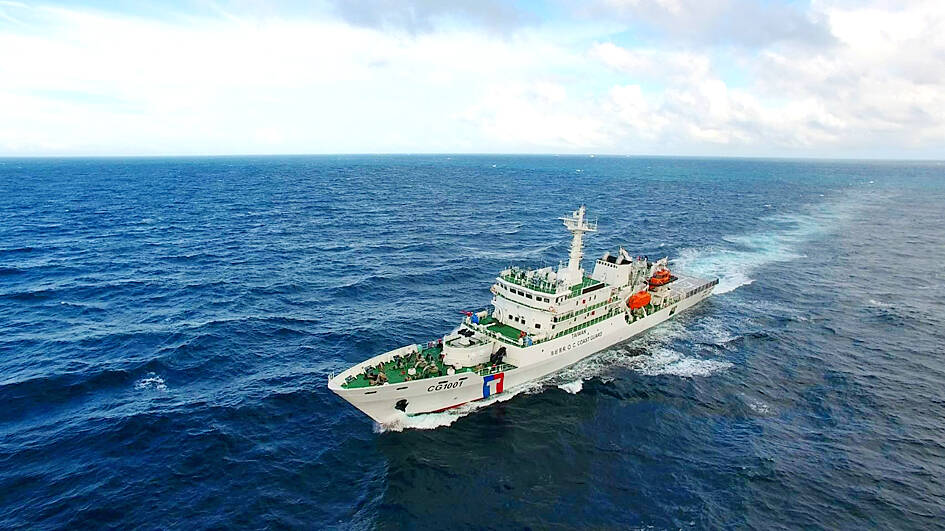Taiwan has identified 52 “suspicious” Chinese-owned ships flying flags of convenience that require close monitoring if detected near the nation, the Coast Guard Administration (CGA) said yesterday, as the nation seeks to protect its subsea telecoms cables.
The stricter regime comes after a Cameroon-flagged vessel was briefly detained by the CGA earlier this month on suspicion of damaging an international cable northeast of Taiwan.
The vessel is owned by a Hong Kong-registered company with a Chinese address given for its only listed director, the CGA said previously.

Photo courtesy of the Coast Guard Administration via CNA
Taiwan fears China could sever its communication links as part of an attempt to seize the nation or blockade it.
Flags of convenience allow shipping companies to register their vessels in countries to which they have no link -- for a fee and freedom from oversight.
The CGA said 52 “suspicious” Chinese-owned ships flying flags of convenience from Mongolia, Cameroon, Tanzania, Togo and Sierra Leone had been highlighted for close monitoring based on port records and data from Tokyo MOU, a regional multilateral body for port state control.
Of the 52 vessels, 15 were rated a “threat” for various reasons — including the amount of time they spent loitering or sailing slowly near Taiwan’s subsea cables last year.
Five, considered to pose the greatest threat, had been active in Taiwan’s northern, western and southern waters, and had stayed “within Taiwan’s territorial waters for more than 15 days,” the CGA said in a statement.
The CGA said it would monitor for “anomalies” in a ship’s automatic identification system operation and “fake or misuse of vessel names.”
Vessels suspected of “loitering, slow navigation or anchoring” near subsea cables would be warned by radio to leave the area, the CGA said.
“If the vessel does not comply, coast guard ships will be dispatched to collect evidence and drive the vessel away,” it said. “Boarding inspections will be conducted when necessary to safeguard Taiwan’s maritime and international communications security.”
Taiwan has 14 international underwater cables and 10 domestic ones.
In February 2023, two telecom lines serving outlying Lienchiang County (Matsu) were cut, disrupting communications for weeks.

FOUR DESIGNATED AREAS: Notices were issued for live-fire exercises in waters south and northwest of Penghu, northeast of Keelung and west of Kaohsiung, they said The military is planning three major annual exercises across the army, navy and air force this month, with the navy’s “Hai Chiang” (海強, “Sea Strong”) drills running from today through Friday, the Ministry of National Defense said yesterday. The Hai Chiang exercise, which is to take place in waters surrounding Taiwan, would feature P-3C Orion maritime patrol aircraft and S-70C anti-submarine helicopters, the ministry said, adding that the drills aim to bolster the nation’s offshore defensive capabilities. China has intensified military and psychological pressure against Taiwan, repeatedly sending warplanes and vessels into areas near the nation’s air defense identification zone and across

FORCED LABOR: A US court listed three Taiwanese and nine firms based in Taiwan in its indictment, with eight of the companies registered at the same address Nine companies registered in Taiwan, as well as three Taiwanese, on Tuesday were named by the US Department of the Treasury’s Office of Foreign Assets Control (OFAC) as Specially Designated Nationals (SDNs) as a result of a US federal court indictment. The indictment unsealed at the federal court in Brooklyn, New York, said that Chen Zhi (陳志), a dual Cambodian-British national, is being indicted for fraud conspiracy, money laundering and overseeing Prince Holding Group’s forced-labor scam camps in Cambodia. At its peak, the company allegedly made US$30 million per day, court documents showed. The US government has seized Chen’s noncustodial wallet, which contains

SUPPLY CHAIN: Taiwan’s advantages in the drone industry include rapid production capacity that is independent of Chinese-made parts, the economic ministry said The Executive Yuan yesterday approved plans to invest NT$44.2 billion (US$1.44 billion) into domestic production of uncrewed aerial vehicles over the next six years, bringing Taiwan’s output value to more than NT$40 billion by 2030 and making the nation Asia’s democratic hub for the drone supply chain. The proposed budget has NT$33.8 billion in new allocations and NT$10.43 billion in existing funds, the Ministry of Economic Affairs said. Under the new development program, the public sector would purchase nearly 100,000 drones, of which 50,898 would be for civil and government use, while 48,750 would be for national defense, it said. The Ministry of

SENATE RECOMMENDATION: The National Defense Authorization Act encourages the US secretary of defense to invite Taiwan’s navy to participate in the exercises in Hawaii The US Senate on Thursday last week passed the National Defense Authorization Act (NDAA) for Fiscal Year 2026, which strongly encourages the US secretary of defense to invite Taiwan’s naval forces to participate in the Rim of the Pacific (RIMPAC) exercise, as well as allocating military aid of US$1 billion for Taiwan. The bill, which authorizes appropriations for the military activities of the US Department of Defense, military construction and other purposes, passed with 77 votes in support and 20 against. While the NDAA authorizes about US$925 billion of defense spending, the Central News Agency yesterday reported that an aide of US